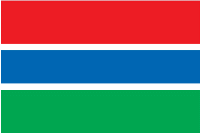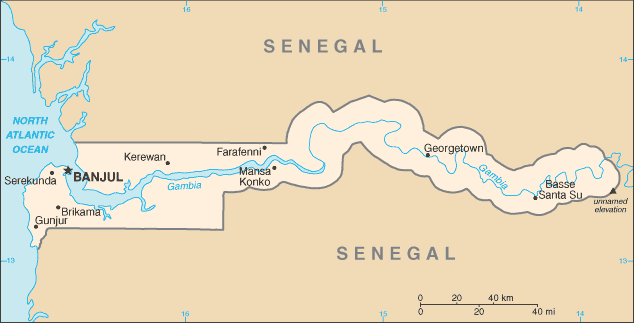Sep 3 2012
Topics Covered
Welcome to Gambia
Overview of Resources
Industrial Minerals and Gemstones
Fossil Fuels
Investment
Sources
Welcome to Gambia
Gambia is located in Western Africa and shares its borders with Senegal on three sides. The total area of the country is 11,295 km2 with a population of 1,840,454 as of July 2012. Its climatic condition is mostly tropical.
 |
The national flag of Gambia.
Image Credit: CIA Factbook. |
Since gaining independence in 1965, Gambia has witnessed political turmoil and poor governance resulting in huge debts.
Gambia has limited natural resources consisting of laterite, titanium, rutile, ilmenite, tin, zircon, and silica sand. The mining industry does not play a significant role in the country’s economy and the economy relies more on tourism, imports and agriculture. The country also depends on bilateral and multilateral aid. The GDP of the country as of 2011 was $3.541 billion.
Overview of Resources
Gambia’s mining industry is very small as the country does not possess large mineral reserves or any discovered deposits of precious stones or gems. However, experts believe that lower value mineral deposits are present in some areas.
Details of Gambia’s mineral commodities production in 2010 are provided below:
- Laterite increased by 69% to 174,000 Mt from 103,000 t in 2009
- Ilmenite increased by 28% to 69.9 million Mt from 54.6 Mt
- Silica sand increased by 6% to 1.12 Mt from 1.06 Mt
Exports and imports data of Gambia for 2010 is as follows:
- Exports to USA amounted to $3.1 million in 2010 compared to $1.2 million in 2009
- Imports from USA amounted to about $29 million in 2010 compared to $34 million in 2009
Gambia has purchased $114,000 worth of drilling and oilfield equipment and $167,000 worth excavating machinery from USA in 2010. The country does not produce petroleum and relies on imports to meet its domestic needs.

The map of Gambia. Image Credit: CIA Factbook.
Industrial Minerals and Gemstones
Currently, mining operations are being carried out in areas with glass and quartz sand deposits to unearth valuable minerals especially along the southern coast of Banjul.
Carnegie Minerals (Gambia) Ltd. (CML), which is a joint venture of Australian companies Astron Ltd. and Carnegie Corp. Ltd., is involved in legal disputes regarding mining rights to the Batukunku, the Kartung, and the Sanyang mineral sands deposits in Brufut.
Fossil Fuels
African Petroleum Corp. Ltd. of Australia via its subsidiary African Petroleum Gambia Ltd. had signed an agreement with Buried Hill Gambia B.V. in 2010 entitling them to 60% operating privileges and interest in the offshore Blocks A-1-Alhamdulilah and A-4. The government has approved this agreement and has extended the initial exploration time until December 2013.
Investment
Gambia has a long way to go to establish its mineral industry and gain revenue from its unexploited reserves.
According to experts, the following factors will help strengthen the country’s mining sector and ensure some economic progress in the future:
- Stable government
- Responsible economic management
- International donors and lenders
- Technical assistance
- High level fiscal management
- Reduction of debt
Disclaimer: The Author of this article does not imply any investment recommendation and some content is speculative in nature. The Author is not affiliated in any way with any companies mentioned and all statistical information is publically available.
Sources